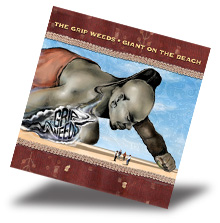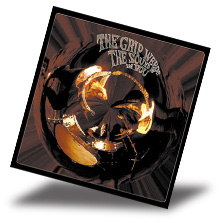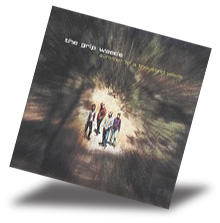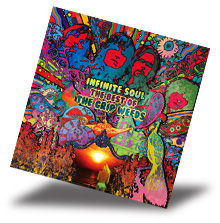
SoundstageAV.com
Ottawa, Ontario (Canada)
January 15, 2009
Way Wicked Cool
I wish I could claim enough cool to be able to say I’ve known about the Grip Weeds since the debut of their first CD, House of Vibes,in 1994. But I first heard them only a year ago, when I received a copy of that album’s reissue edition, House of Vibes Revisited. I was immediately smitten. I continue to be an avid fan of rock’n’roll, and keep an ear open for bands that recapture the excitement I felt when, at 11, I first heard the Who’s "I Can See for Miles," on the kitchen radio. House of Vibes Revisited is that kind of disc. The guitars are as ferocious as they are precise and elegant, the drums hit hard, and the songs have burrowed their way into my mind and haven’t let go.
I’ve since picked up the rest of the Grip Weeds discs, and have discovered that their first was no fluke. Each song is a well-polished gem, each detail in the recording carefully worked out, yet the results never sound stiff or calculated. The Grip Weeds retain the spontaneity of the best rock’n’roll while creating music that’s carefully crafted and tightly performed, in the same way the bands that inspired them did. I hear echoes of the Who, the Kinks, the Move, the Left Banke, and many other great bands here, yet the Grip Weeds don’t sound derivative. As those bands did in their day, they borrow what they need from their predecessors, adding their own talents and personalities to create something new and brilliant.

The band’s four albums are consistently engaging, free of filler, and crammed with great songs you can return to repeatedly and still find something new. A new compilation, Infinite Soul: The Best of the Grip Weeds,includes selections from each of them, and it’s a good introduction to the band. But if you love melodic rock’n’roll, you’ll wind up getting all their albums. You won’t want to be without "Out of Today," from House of Vibes; or lead guitarist Kristin Pinell’s wah solo in "What I Believe Is You," from The Sound Is In You; Pinell’s vocal on the band’s cover of the Who’s "Melancholia," from Summer of a Thousand Years; or Mike Kelly’s killer bass playing on "Realities," from Giant on the Beach.
Despite the sometimes retro feel of their albums’ artwork -- the cover of Infinite Soul looks a lot like that of Cream’s Disraeli Gears -- the Grip Weeds aren’t throwbacks. "We used Sixties Rock as our launching pad and developed our sound from there," drummer Kurt Reil told me in an e-mail. "It took us some time to develop our own sound, like we had to work through our influences first to find out where we wanted to go with our music." For the Grip Weeds, the possibilities of songcraft and melodic inventiveness established by the great musicians of ’60s rock haven’t yet been exhausted, which is why the band’s music still has the kick, thrill, and immediacy of something new and exciting.
The Grip Weeds formed in New Brunswick, New Jersey, when Kurt Reil and his brother, Rick, were in college. Both started out playing drums when they were kids, but Rick switched to guitar when he and his brother "couldn’t find enough like-minded players for two separate bands." While the Reils were in New Brunswick, Jim Babjak of the Smithereens was their mentor. "He had a local music/video store where lots of music types would hang out, including us, and eventually he hooked us up with Tim Mesko and Jeff Jefferson (now of The Swingin’ Neckbreakers) to form The Grip Weeds. Kristin Pinell replaced Tim in 1993 just in time for our first album. With Kristin on guitar we really defined and focused our sound."
The band arrived at its name because it wanted "something earthy, because we hated music that sounded slick or synthesized." They remembered John Lennon’s character, Private Gripweed, from Richard Lester’s 1967 film, How I Won the War. "We thought calling ourselves The Grip Weeds would give us a very obscure touchstone to the Beatles for those in the know. For those who didn’t know, the name would be defined by our music." Although the band liked many of the popular bands of the ’60s, they often didn’t pick the usual bands to cover. "We really gravitated towards music from the sixties that you’d never hear on the radio -- you had to dig for it back then -- you couldn’t just go on iTunes and ‘click to buy’."
As the band sharpened its skills playing live, Kurt and Rick were also learning about songwriting, and eventually gained enough confidence to begin writing their own material. "The early version of The Grip Weeds, before Kristin joined, came together mostly to play obscure sixties covers, with some originals thrown in as we were writing them. We would add songs of our own to the sets of covers we played, and we wanted our songs to measure up to them. It was like going to songwriting school -- we were eager students intent on finding out what made those songs great, and figuring out how to do it for ourselves."


Soon after Pinell joined the band, they began recording their first full-length album and found they preferred the feel of homemade demos to recordings done in a professional studio. As Kurt Reil points out in the liner notes of House of Vibes Revisited,"When you’re on the clock there’s always one thing on your mind: You’ve got to get it done, and fast." The solution was to pick up studio gear, at first primitive, but much improved by the time the band moved into an old Victorian house to begin work. The first studio in the house was on a converted porch, and the intercom between the control room and the studio was a pair of Star Wars walkie-talkies.
While the tools used to create House of Vibes may sound simple on paper, the results on disc are remarkable. The Reil brothers, who engineer and mix the Grip Weeds recordings, have obviously logged some headphone time to learn how great pop records are constructed, and they’ve only gotten better at making them. The band’s albums are wonderfully layered, with subtle instrumental and vocal details that make them rich listening experiences. I was pleased to find an "AAD" SPARS code on the back of Summer of a Thousand Years. When I asked Kurt Reil about his and his brother’s preferred recording method, he responded, "‘Pro analog?’ You have to ask? (ha!)"
Convenience has led the Grip Weeds to use digital in some stages of recording, but analog makes their work sound warm and musical. "We love the sound of tape, and everything we do begins on a 16-track 2" machine -- we cut our basic tracks in analog and then transfer to digital for overdubs. There’s something about the warmth and power of tape that is hard to duplicate. Also, even though we use digital technology in the recording process, our mixes are analog." One of the band’s trademarks is their tight vocal harmonies, which they record live in the studio. "We sing together but on different mics, so we can adjust the blend of voices later and do touchups easier. Sometimes it’s easier to just put each part down separately, but you miss the magic that you get when you sing together, each reacting and bending to the other voice."
Little Steven Van Zandt, of Bruce Springsteen’s E Street Band, heard the Grip Weeds and put them in rotation on Little Steven’s Underground Garage, his syndicated radio show. Van Zandt compiled Infinite Soul for his label, Wicked Cool Records, which champions garage rock and power pop. In a 2002 essay on garage rock, he wrote: "Songwriting is pretty much a lost art, but if new bands study the sixties (as every band in ANY genre should do) and compare their stuff to the 20 or 30 great Garage classics, something good is bound to happen."
The Grip Weeds have studied carefully and learned well. That they’re now in the studio recording their next album gives me reason to feel hopeful about 2009.
. . . Joseph Taylor
josepht@soundstageav.com

